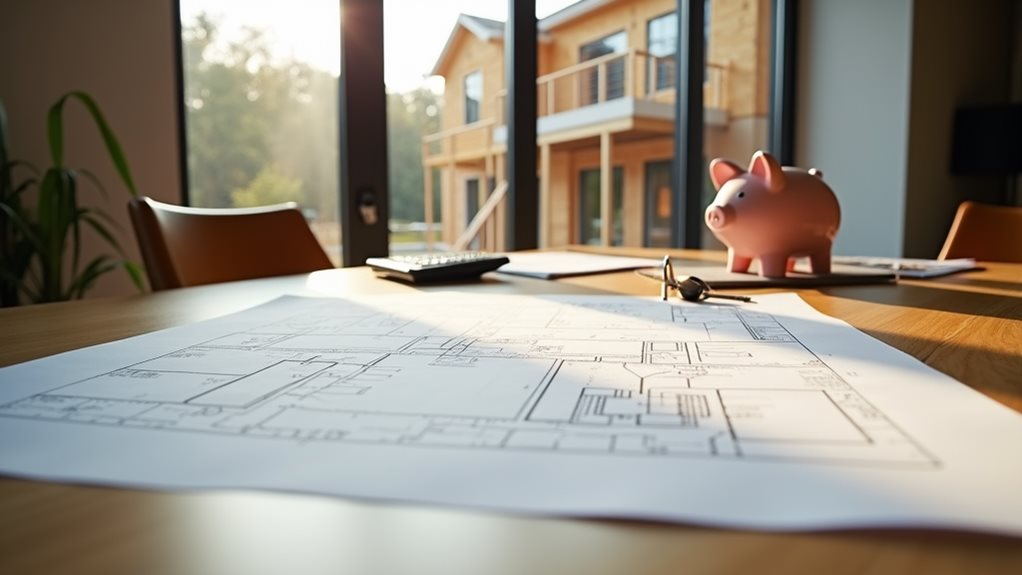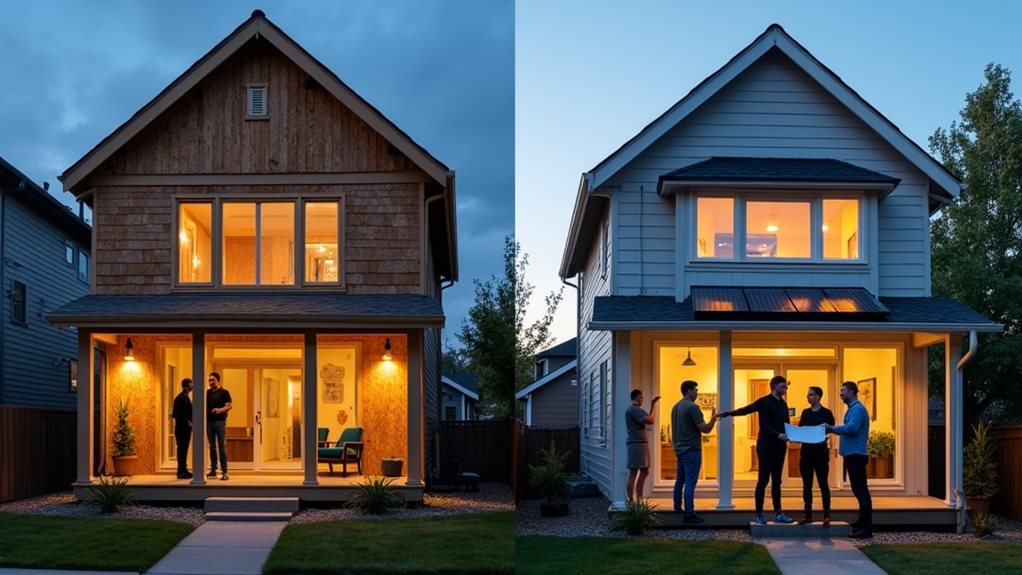Phone:
(701)814-6992
Physical address:
6296 Donnelly Plaza
Ratkeville, Bahamas.

Obtain your dream home extension without paying interest through these seven proven financing methods that savvy homeowners use.
You'll find multiple interest-free options to finance your home extension, including government-backed FHA Title I loans offering up to $25,000 and USDA Section 504 programs providing loans at 1% interest. Local non-profits and Community Development Block Grants offer zero-interest solutions, while credit card promotions and contractor payment plans provide temporary interest-free periods. Exploring homeowner assistance programs and community-based initiatives can reveal additional funding pathways to transform your living space.

When you're looking to finance your home extension, government-backed FHA Title I loans offer a structured financing option that's worth exploring.
These loans provide up to $25,000 for single-family homes with fixed terms up to 20 years, making them an attractive choice for homeowners seeking reliable financing.
Among the key FHA loan benefits, you'll find flexible credit requirements and a manageable debt-to-income ratio cap of 45%. The loan program allows for general home repairs and accessibility upgrades that improve livability.
To streamline your loan application, here are essential tips: make certain you've owned your home for at least 90 days, verify it's your primary residence, and prepare documentation of your income.
While you don't need equity in your home, you'll want to compare multiple FHA-approved lenders to secure the best terms.
Beyond FHA options, the USDA Section 504 Rural Development Program stands out as a valuable resource for rural homeowners seeking financial assistance for property improvements.
If you're struggling to find affordable credit and meet the USDA eligibility criteria, you could qualify for up to $40,000 in loans at a modest 1% interest rate over 20 years. The program prioritizes helping very-low-income households remain in their homes while building equity.
For homeowners aged 62 and older, you'll be pleased to know there's an additional opportunity: grants up to $10,000 for removing health and safety hazards.
However, be mindful of the grant repayment terms – you'll need to return the funds if you sell your property within three years.
You can even combine loans and grants for maximum support of $50,000, making this program particularly attractive if you're looking to improve your rural home.

Looking for a cost-effective way to finance your home extension? Local non-profit zero-interest programs might be your ideal solution.
These community-focused initiatives help homeowners like you complete essential renovations without the burden of interest charges.
You'll find these valuable programs through organizations such as Habitat for Humanity and NeighborWorks America, or through your local government's housing department.
To qualify, you'll typically need to meet specific income requirements and own your primary residence.
These programs are designed specifically for homeowners who want to improve their properties while maintaining affordable monthly payments. Additionally, specialized services offered by local builders can enhance your extension project, maximizing the benefits of your investment.
The benefits extend beyond your wallet – you're not just investing in your home, you're participating in community development that helps maintain neighborhood property values.
Contact your local housing agency today to explore available programs.
Zero-interest credit card promotions provide another compelling financing avenue for your home extension project.
You'll join many savvy homeowners who've discovered that these promotional periods, typically lasting 6-18 months, can help you manage large renovation costs without accruing interest charges.
To maximize your benefits, you'll want to focus on both credit card rewards and managing balances effectively.
Look for cards offering substantial welcome bonuses and enhanced cash back in home improvement categories.
You'll need to carefully plan your monthly payments to guarantee you're debt-free before the promotional period ends.

When searching for contractors who offer zero-interest payment plans, you'll need to research their qualifications, reputation, and financing partnerships with established institutions like Synchrony.
Before signing any agreement, you'll want to thoroughly examine the payment terms, including the duration of the zero-interest period, monthly payment amounts, and potential penalties for late payments.
While many contractors offer attractive financing options ranging from 6 to 36 months interest-free, you should carefully review any clauses about retroactive interest charges that might apply if you don't pay off the balance within the promotional period.
Finding contractors who provide zero-interest payment plans can greatly reduce the financial burden of your home extension project.
When searching for qualified professionals, you'll want to focus on contractor qualifications and their zero interest partnerships with reputable organizations. Many reliable contractors collaborate with non-profit groups and government agencies to offer these financing options, making your renovation dreams more achievable.
To guarantee you're working with the right contractor, consider these essential steps:
Understanding the fine print of contractor payment plans can make or break your home extension project's success. You'll want to guarantee you're getting clear payment schedule clarity from your contractor before signing any agreements.
Most reputable contractors will offer detailed estimates broken down into stages, making it easier for you to track progress and payments.
When discussing terms with your contractor, you'll find that contractor transparency is essential. Never pay for all the work upfront, and make sure you've got everything in writing.
You can protect yourself by agreeing to staged payments that align with specific project milestones, such as foundation completion or final finishing work.
Consider negotiating a retention fee of about 2.5% for six months after completion to guarantee any minor issues are addressed promptly.
The landscape of zero-interest payment plans offers homeowners remarkable flexibility in financing their extensions, with durations spanning from 12 months to an impressive 20 years.
You'll find that loan duration options adapt to your financial situation, allowing you to manage your budget effectively while transforming your home.
When exploring these financing options, you'll appreciate these key benefits:
You're joining countless homeowners who've discovered that zero-interest payment plans offer an intelligent way to fund home improvements while maintaining financial stability and peace of mind.

If you're looking to fund your home extension project, you'll want to check whether you qualify for Community Development Block Grants in your area.
These federal grants, distributed through local governments, can help cover renovation costs if your household income falls below 80% of your area's median income.
You'll need to verify that your planned extension aligns with CDBG's housing improvement objectives and submit an application through your local housing or community development office.
When planning significant home improvements, you'll find that Community Development Block Grants (CDBG) offer valuable funding opportunities for eligible homeowners.
Through community engagement with your local housing department, you can explore these federal funds designed to help improve living conditions in your area.
To qualify for CDBG funding eligibility, you'll need to meet specific criteria:
Your local housing authority can guide you through the application process, which typically involves submitting detailed project plans and financial documentation.
Remember that while CDBG funds are competitive, they're particularly valuable because they don't require repayment when used for approved home improvements.
Understanding income-based requirements stands as an essential first step for homeowners seeking Community Development Block Grants, since these federal funds specifically target assistance to low and moderate-income households.
When you're exploring CDBG eligibility criteria, you'll need to take into account factors beyond just your income, including your area's poverty levels and housing conditions.
You'll want to actively participate in your community's grant process, as citizen participation requirements mandate public hearings where you can voice your needs.
You'll have access to local meetings and information, and if English isn't your first language, you're entitled to accommodations during these sessions.
Zero-interest home improvement loans represent a valuable lifeline for homeowners seeking to renovate or repair their properties without the burden of interest charges.
You'll find these programs particularly beneficial if you're looking to enhance your home's value while managing costs effectively. To qualify for home improvement eligibility, you'll need to meet specific criteria and demonstrate your ability to repay the loan.
Consider these key zero interest benefits that can make your renovation dreams achievable:
These programs, often available through government agencies and non-profit organizations, provide an excellent opportunity to join other homeowners in maintaining and improving your property while keeping costs down.
Properly planning your home extension's payment path can prevent painful financial pressures later. You've got several savvy solutions at your disposal, from federal funding to zero-interest arrangements. Whether you're considering contractor payment plans or community grants, these seven strategies provide promising paths to upgrade your home without interest burdens. Take time to thoroughly evaluate each option, ensuring you'll make the most financially sound choice for your specific situation.